Fracking operations in California require extensive insurance coverage and strict regulatory compliance. Companies must maintain general liability policies of $250,000 per well, plus $5 million in extended coverage for health and environmental damage. Environmental Impairment Liability policies specifically address groundwater contamination risks, while workers' compensation is vital due to high industry mortality rates. Understanding the complex interplay between insurance requirements, environmental regulations, and liability issues helps operators navigate California's evolving fracking landscape.
Key Takeaways
- California requires comprehensive insurance coverage including $250,000 per well for plugging and $5 million for health/environmental damage.
- Senate Bill 4 mandates permits, chemical disclosure, and environmental reviews, establishing California's primary fracking regulatory framework.
- Operators face significant coverage gaps for gradual contamination risks, induced seismicity, and long-term health impacts.
- Property owners near fracking operations risk value depreciation of 3-14%, with water contamination potentially causing 24% decline.
- Environmental Impairment Liability policies are crucial for groundwater contamination coverage, while standard policies typically exclude pollution risks.
The Evolution of Fracking Regulations in California

While fracking operations had long existed in California, the state's regulatory framework was particularly absent before 2014. The Division of Oil and Gas operated without monitoring hydraulic fracturing, considering it less significant than operations in the eastern United States. This gap in oversight marked a vital chapter in California's fracking history.
The regulatory challenges became more apparent when basic operational information, including fracking locations and chemical usage data, remained undocumented. Public concern intensified following a worker's death in a 2011 Kern County fracking discharge incident. Adding to the controversy, Occidental Petroleum's $250,000 contribution to Governor Brown's campaign coincided with relaxed enforcement of underground injection controls. These events highlighted the pressing need for formal oversight and prompted discussions about implementing extensive regulations.
Key Insurance Requirements for Fracking Operations
Insurance coverage for fracking operations in California requires multiple layers of protection to address various risks. Companies must maintain extensive general liability policies for basic incidents, while specialized environmental coverage helps protect against pollution-related claims that standard policies typically exclude. Workers' compensation insurance remains mandatory for protecting employees, though the high-risk nature of fracking operations often demands additional coverage beyond basic requirements.
Liability Coverage Basics
Although fracking operations in California face complex regulatory requirements, understanding the basic liability coverage framework is essential for operators. Commercial General Liability (CGL) policies provide fundamental protection for third-party bodily injury and property damage claims, including defense costs. However, most CGL exclusions severely limit coverage for pollution-related incidents, particularly those involving fracking fluids.
Environmental Impairment Liability (EIL) policies fill critical coverage gaps by addressing government-mandated cleanup costs for groundwater contamination. EIL compliance requires adherence to CalGEM's well-casing regulations and often demands proof of causation between fracking activities and contamination claims. Additional considerations include D&O coverage for shareholder lawsuits and Underground Resource and Equipment endorsements, which protect against damage to third-party wells and equipment.
Environmental Risk Protection
How do fracking operators navigate California's complex environmental risk protection requirements? The state mandates thorough risk assessment protocols and environmental safeguards through tiered insurance structures. Operators must secure multiple layers of coverage to address potential environmental impacts.
Key insurance requirements include:
- Base coverage of $250,000 per well for plugging and abandonment
- Extended coverage of $5 million per well for health and environmental damage
- Environmental pollution insurance of $1 million per well, maintained for at least 5 years after closure
These requirements aim to protect against chemical exposure, water contamination, and long-term environmental risks. Operators must also comply with strict chemical disclosure laws, unlike the more lenient national FracFocus standards. This guarantees transparency and accountability in addressing potential environmental hazards throughout the fracking lifecycle.
Workers' Compensation Requirements
California's evolving workers' compensation landscape greatly impacts fracking operators, who must now comply with stringent coverage requirements under SB 216. By January 2026, all contractors involved in fracking operations must maintain workers' compensation insurance, regardless of employee status.
Fracking companies face unique compliance challenges due to the industry's high-risk nature. They must secure coverage from California-licensed insurers and maintain continuous policies to avoid license suspensions. Coverage options include traditional insurance policies or self-insurance certifications from the Department of Industrial Relations. Companies must submit electronic certificates to CSLB, listing their specific classification codes based on payroll distribution. Out-of-state operators need form 13L-50 for non-California workers, while ghost policies may serve independent contractors without employees. Non-compliance results in immediate license suspension and potential revocation.
Environmental Liability Coverage Essentials
When exploring fracking operations in California, environmental liability coverage presents significant challenges for insurers and operators alike. Standard Commercial General Liability (CGL) policies often include strict pollution exclusions that limit fracking liability coverage. These policies typically require specific conditions for coverage, including prompt reporting of incidents within tight deadlines.
Key challenges with environmental liability coverage include:
- Absolute pollution exclusions that require sudden releases to be discovered within 30 days and reported within 60 days
- Limited coverage for gradual contamination, which is common in fracking operations
- Regulatory gaps that complicate insurance coverage, especially with California's expedited permit system
The recommended minimum financial assurance of $250,000 per well for plugging and reclamation costs reflects the substantial risks involved in fracking operations.
Water Contamination Risk Management
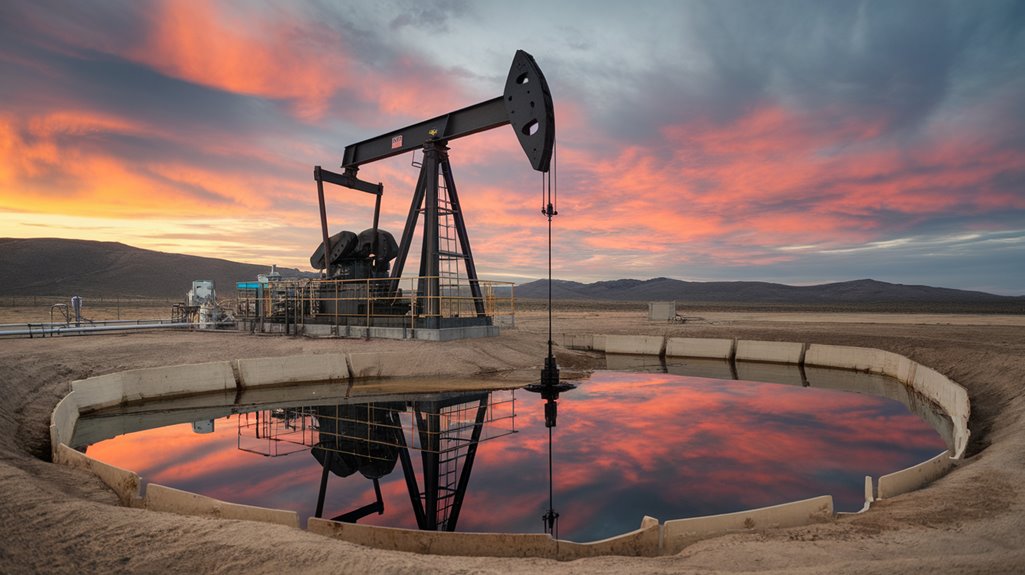
Water contamination from fracking operations poses severe financial and environmental risks that demand thorough management strategies. High concentrations of toxic chemicals, including benzene and arsenic, in fracking wastewater threaten both surface and groundwater resources. Recent cases in California highlight the costly consequences, as evident in the $8.5 million Kern County settlement for contaminated groundwater.
Effective wastewater management requires rigorous monitoring of storage facilities, injection wells, and disposal practices. California's current regulatory framework shows significant gaps, with incomplete chemical reporting and inadequate oversight of disposal methods. Companies must implement extensive containment systems, regular testing protocols, and proper documentation to mitigate risks. This includes preventing illegal dumping, maintaining secure storage facilities, and ensuring compliance with state regulations to avoid costly litigation and environmental damage.
Seismic Activity Coverage Considerations
Insurance coverage for fracking-induced seismic activity presents complex challenges for both insurers and policyholders. The rise in human-induced earthquakes has created significant insurance ambiguity, especially regarding standard policy exclusions for man-made events. Data from the USGS shows a twentyfold increase in magnitude 3.0+ earthquakes in central and eastern US regions between 2010-2013.
Key seismic risk considerations include:
- Standard earthquake policies may not cover fracking-induced tremors
- Only 10% of California homeowners carry earthquake insurance
- Earth movement coverage requires additional premiums based on proximity to fracking zones
This coverage gap leaves many properties vulnerable, while insurers struggle to accurately assess risks due to the complex nature of fracking-induced seismic events and limited historical data for modeling purposes.
Property Damage and Third-Party Claims
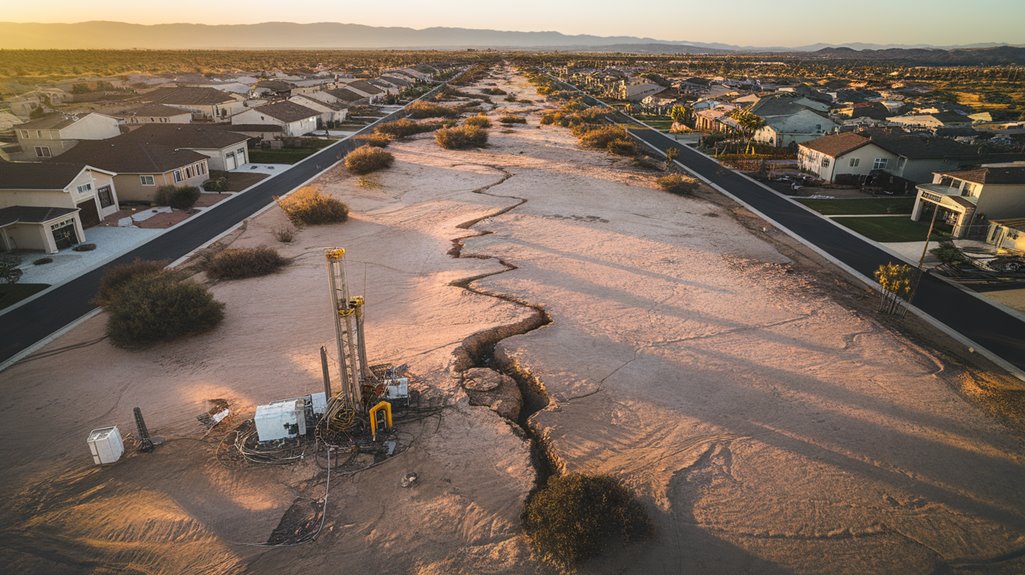
Property damage from fracking operations extends beyond the drilling site to affect neighboring properties through structural impacts and decreased real estate values. California's incomplete disclosure requirements make it difficult for property owners to prove direct causation when seeking compensation for damages. Third-party liability claims often arise from adjacent landowners who face both immediate physical risks and long-term financial losses due to proximity to fracking sites.
Structural Integrity Risks
The structural integrity of fracking wells poses significant risks for both property damage and third-party claims in California. Recent data from Pennsylvania shows that 6-7% of wells experienced structural integrity failures within just three years, highlighting the potential for similar issues in California's more seismically active environment.
Key well integrity concerns that increase contamination risks include:
- Cement and steel casing failures that create pathways for chemicals to reach groundwater
- High injection pressures that stress well infrastructure
- Seismic activity that can compromise well stability and increase failure rates
Baseline water testing has become essential for measuring contamination levels before and after fracking operations. The presence of harmful chemicals and carcinogens in produced water makes structural failures particularly concerning for nearby property owners and communities.
Property Value Impacts
Real estate values near fracking operations face substantial declines, with documented reductions ranging from 3% to 70% depending on proximity and environmental impacts. Studies show homes within 1,000 feet of wells experience property depreciation between 3% and 14%, while water contamination risks can drive values down by up to 24%.
Market perception plays a significant role, as ecological stigma makes properties near drilling sites harder to sell. In extreme cases, like Wise County, Texas, property values collapsed by 70% after drilling contamination. The economic impact extends beyond direct property damage, affecting entire communities. In North Dakota, oil boom activities caused housing costs to spike dramatically, displacing residents on fixed incomes. Legal settlements, while sometimes generous, often still result in homeowners relocating due to ongoing environmental concerns.
Adjacent Land Liability
When fracking operations affect neighboring properties, legal liability becomes a complex web of regulatory gaps and disputed responsibilities. California’s framework for addressing adjacent land impacts remains unclear, particularly regarding subsurface intrusions and fluid migration between properties. This ambiguity often leaves affected property owners with limited recourse, as they navigate a system that does not clearly define the rights and obligations of fracking companies. In recent discussions, stakeholders have highlighted the need for clearer regulations to protect landowners and ensure responsible resource extraction, especially in regions like the Bay Area that are home to numerous domestic partnerships in the Bay Area. By fostering collaboration among local governments, industry experts, and community advocates, California could work towards a more transparent and equitable framework that addresses these pressing concerns.
Three key challenges complicate liability determinations:
- Trespass claims require proof of wrongful intent or negligence, while production impacts alone may not justify legal action
- Regulatory gaps leave unresolved liability for inter-lease fluid migration, despite known health risks
- Multiple emission sources and overlapping mineral rights make it difficult to establish clear causation
The correlative rights doctrine further complicates matters by allowing operators to drain shared reservoirs, typically favoring drilling remedies over injunctive relief. This leaves many communities shouldering cumulative impacts without clear legal recourse.
Workers' Compensation in Fracking Operations
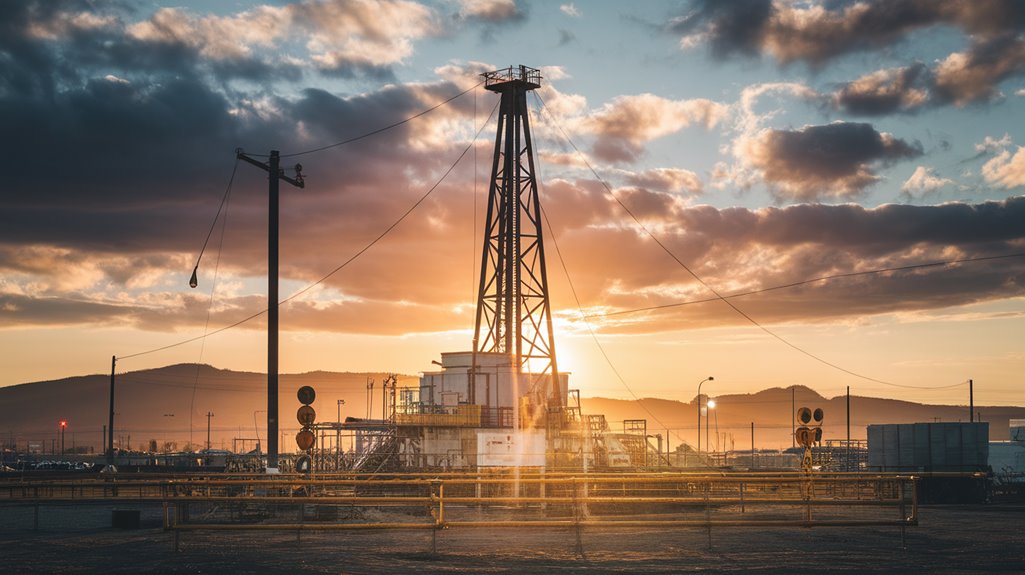
Despite California's robust workers' compensation system, fracking employees face unique challenges when seeking benefits for workplace injuries and illnesses. The industry's high-risk nature, with mortality rates seven times higher than other sectors, creates complex scenarios for claims advocacy and injury documentation.
Workers commonly encounter delays, denials, and employer intimidation when filing claims, particularly for injuries involving toxic chemical exposure or equipment accidents. The lack of transparency around fracking fluid compositions further complicates proving workplace-related health issues. Insurance premiums reflect these elevated risks, with fracking operations paying up to $17 per worker-hour compared to $0.20 for low-risk jobs. Additionally, workers often struggle with insufficient education about their compensation rights, leading to underreporting and delayed medical treatment for serious injuries.
Regulatory Compliance and Insurance Documentation
Maintaining proper regulatory compliance and insurance documentation poses significant challenges for California’s fracking operators. Recent regulatory updates require extensive environmental assessments, chemical disclosures, and groundwater testing, while insurance challenges include managing pollution exclusions and locating historical policies. These stringent requirements demand that operators adopt meticulous record-keeping practices and consult legal experts to ensure full compliance. Additionally, navigating implied consent laws in California adds another layer of complexity, particularly when addressing environmental liability and stakeholder transparency. As a result, companies must proactively manage both regulatory obligations and insurance coverage to mitigate financial and legal risks.
Key compliance requirements that operators must address:
- Obtaining DOGGR permits and conducting mandatory environmental impact studies
- Maintaining detailed chemical disclosure logs and groundwater testing records
- Filing timely insurance notices across multiple jurisdictions while tracking policy deadlines
Operators often struggle to find pre-1986 Commercial General Liability policies that lack pollution exclusions. Many now rely on Environmental Impairment Liability coverage for long-term ecological risks, though these policies typically exclude gradual contamination. Secondary evidence like payment records may help prove historical coverage when original documentation is missing.
Risk Assessment Strategies for Operators
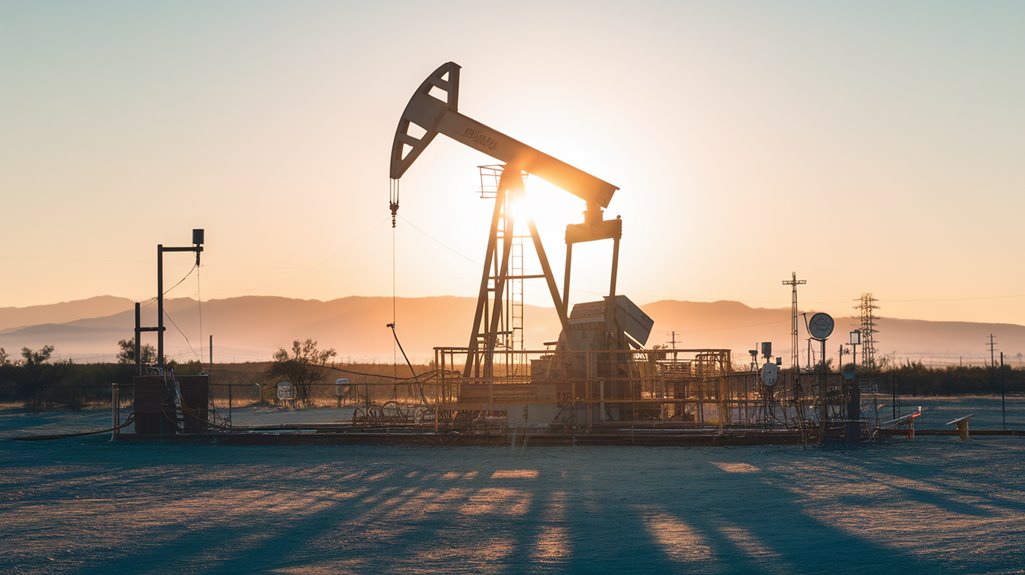
Operators must develop thorough risk assessment strategies that account for California's unique geological challenges, particularly in the Monterey Shale formation. A detailed Environmental Impact Analysis Matrix helps companies identify potential groundwater contamination risks and determine appropriate operational liability coverage levels. Site-specific safety protocols need to address both standard operational hazards and region-specific environmental concerns to guarantee adequate insurance protection and regulatory compliance.
Environmental Impact Analysis Matrix
Given the increasing regulatory scrutiny of fracking operations in California, an all-encompassing environmental impact analysis matrix serves as a critical tool for risk assessment and compliance. With the state's prohibition on new well stimulation permits, operators must carefully evaluate their environmental footprint through detailed impact assessments and align with current environmental policy requirements.
Key components of the environmental impact analysis matrix include:
- Thorough evaluation of public health risks from fracking operations, including air and water quality impacts
- Documentation of mitigation measures to address "unavoidable" environmental risks identified by regulators
- Regular updates to risk assessment protocols based on evolving regulatory standards and permit requirements
This systematic approach helps operators maintain compliance while demonstrating their commitment to environmental protection and public safety.
Operational Liability Coverage Needs
Building on the environmental impact assessment framework, extensive liability coverage represents a fundamental requirement for fracking operations in California. Recent liability trends emphasize the need for thorough protection against operational risks, with mandatory coverage levels starting at $5 million for property and health damages.
| Coverage Type | Key Requirements |
|---|---|
| General Liability | Sudden incidents, third-party damage |
| ESL Coverage | Gradual pollution, off-site cleanup |
| OEE Policy | Well control, catastrophic events |
| EPLE | Unintended discharge claims |
Operators must secure both general liability and specialized environmental coverage, as standard casualty programs typically exclude gradual contamination risks. Critical gaps often emerge in areas like induced seismicity and long-term health impacts, requiring careful policy coordination between different coverage types. Timely incident reporting within 60 days remains essential for maintaining valid coverage.
Site-Specific Safety Protocols
A thorough risk assessment strategy forms the foundation of site-specific safety protocols for California fracking operations. Operators must conduct extensive site assessments that align with CalGEM regulations and environmental protection standards. These assessments focus on risk mitigation through careful monitoring and structural safeguards.
Key safety protocols that operators must implement include:
- Installation of triple-lined well casings and cement barriers to protect groundwater
- Deployment of real-time methane monitoring systems and 24-hour leak detection
- Establishment of mandatory setbacks ranging from 3,200 to 4,200 feet from sensitive areas
These measures are supported by strict testing requirements, including pressure tests of well casings and geochemical analysis of fracturing fluids. Regular environmental compliance reporting guarantees ongoing adherence to safety standards while protecting nearby communities and ecosystems.
Legal Framework and Recent Court Decisions
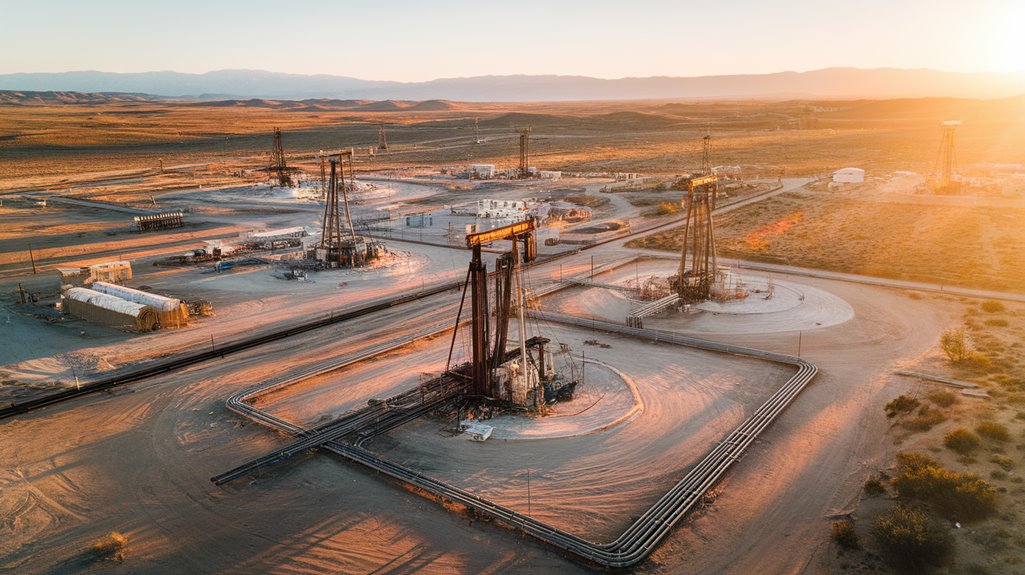
While California's fracking industry operated with minimal oversight for decades, the passage of Senate Bill 4 in 2014 created the state's first extensive legal framework for regulating hydraulic fracturing operations. The law mandated permits, chemical disclosure, and environmental reviews, shifting regulatory costs to oil companies through "polluter pays" fees.
| State | Court Decision | Impact |
|---|---|---|
| Pennsylvania | Upheld local ban | Strengthened municipal control |
| New York | Authorized town bans | Protected community rights |
| Colorado | Struck down local ban | Favored state interests |
| New Mexico | Federal preemption | Limited local authority |
Recent court decisions across states have shaped fracking regulations, with varying outcomes on local control versus state preemption. These rulings continue to influence California's approach to balancing industry interests with environmental and community concerns.
Claims Processing and Settlement Procedures
California's fracking claims require thorough documentation, including initial spill reports within 30 days, insurer notifications within 60 days, and proof of regulatory compliance across multiple agencies. The settlement process typically involves coordinating between multiple parties, from contractors to operators to insurers, with each entity needing to verify their role and liability in the incident. Meeting strict deadlines while gathering detailed evidence remains essential, as demonstrated in cases like Warren vs. ACE where delayed reporting led to coverage denials.
Documentation and Evidence Requirements
Proper documentation and evidence collection form the foundation of successful fracking-related insurance claims in California. Insurance carriers require strict adherence to documentation procedures and evidence preservation protocols to process claims effectively.
Key requirements include:
- Incident reporting within 60 days of discharge discovery, including detailed written notifications about location, substances, and operational context
- Regular water testing data, with baseline measurements conducted quarterly for two years before and after drilling operations
- Extensive records of site ownership, physical proximity documentation, and investigation outcomes
Maintaining thorough documentation helps insureds meet the "sudden and accidental" requirement while supporting potential litigation needs. This includes preserving witness statements, correspondence with regulators, and remediation expense records. Well-organized evidence strengthens both initial claims and any subsequent appeals.
Settlement Timelines and Deadlines
Insurance claims related to fracking operations in California must adhere to strict settlement timelines and regulatory deadlines. Per state regulations, insurers have 30 days to process claims under the Fair Claims Settlement Practices Regulations, with violations resulting in penalties up to $5,000 per claim.
Settlement delays often occur due to various factors, including complex multi-agency oversight for offshore wells and mandatory environmental impact assessments. The legal implications of these delays are particularly significant near geological risk zones, such as the Inglewood Field. Additional complications arise from conflicts between state and federal regulations, especially on federal lands. Water contamination claims face strict liability timelines, requiring rapid laboratory analysis and state notifications. Claims processing must also account for California's broader phase-out plans, including the 2024 permit halt and 2045 oil extraction elimination goal.
Multi-Party Liability Resolution
Multi-party liability resolution in fracking cases requires careful coordination among operators, insurers, and regulatory bodies across federal, state, and local jurisdictions. The process often involves multi-stakeholder negotiations between landowners, operators, and environmental groups, particularly in cases of water contamination or health impacts.
Key aspects of liability apportionment include:
- Technical analysis and independent scientific studies for complex claims like induced seismicity
- Coordination between DOGGR and regional water boards for overlapping jurisdictional matters
- Facilitated negotiations to resolve regulatory ambiguities and establish clear responsibility chains
Mediation remains the preferred method for resolving these disputes, offering confidentiality while enabling business-focused solutions. This approach helps manage the complexities of civil penalties, which can reach $25,000 per violation per day, while maintaining productive relationships between stakeholders.
Emergency Response Planning Requirements
To maintain safe fracking operations in California, oil facilities must comply with thorough emergency response planning requirements at both federal and state levels. A key requirement is the submission of Facility Response Plans (FRP) for operations that lack secondary containment or are located near environmentally sensitive areas.
Facilities storing more than 42,000 gallons of oil and conducting over-water transfers must meet EPA's FRP mandates. Additionally, secondary containment systems must be capable of holding the volume of the largest tank in a given area to prevent potential spills. Regular spill response training and regulatory updates are essential components of compliance. SPCC plans require professional certification from third-party experts every five years when technical modifications are made, ensuring facilities maintain current safety standards and emergency preparedness.
Long-Term Environmental Impact Coverage
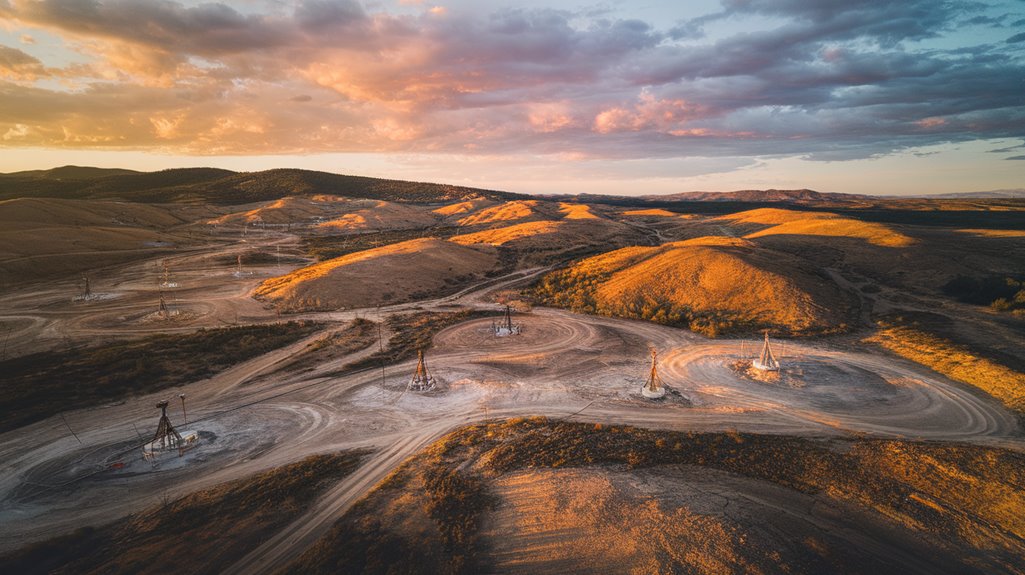
While California's fracking industry faces mounting pressure to secure thorough coverage for environmental damages, insurers remain hesitant to underwrite long-term ecological risks. The data reveals significant challenges for long term sustainability, particularly in regions where fracking operations have disrupted native ecosystems and contaminated groundwater supplies.
Key factors driving insurance complexity include:
- Persistent pollutants found in 92% of fracturing wastewater, exceeding EPA thresholds
- Geological instability in Monterey Shale formations affecting ecological restoration efforts
- Higher-than-average environmental impact rates near vulnerable communities, leading to increased liability exposure
These challenges are compounded by inadequate baseline water quality assessments for 46% of wells and ongoing gaps in groundwater monitoring requirements, making accurate risk assessment particularly difficult for insurers.
Public Health and Safety Insurance Protocols
California's fracking industry faces mounting insurance challenges as public health protocols become increasingly stringent. The implementation of 3,200-foot drilling setbacks and mandatory pollution controls has created new liability considerations for insurers, particularly regarding community health impacts.
Insurance providers must now navigate complex coverage requirements that address both immediate and long-term health risks. The presence of toxic emissions and chemical exposure near drilling sites, coupled with documented health impacts like asthma and cardiovascular diseases, has led to stricter safety standards. Many insurance policies struggle to adequately cover chemical contamination disputes, while public health expert panels continue to influence regulatory decisions. This gap between required safety protocols and available coverage options poses significant challenges for both operators and insurers in California's fracking industry.
Frequently Asked Questions
How Do Insurance Premiums Change During Temporary Fracking Operation Suspensions?
Insurance premiums typically increase markedly during temporary fracking operation interruptions. These premium adjustments occur due to several factors, including extended liability coverage periods, mandatory environmental monitoring costs, and increased risk assessments. Insurers often charge 15-25 times more for per-well coverage during pauses. Additional costs come from required groundwater monitoring (adding about 20% to policy costs) and equipment downtime coverage (3-5% of annual premiums).
Can Multiple Operators Share a Single Insurance Policy for Joint Ventures?
Multiple operators can share a single insurance policy for joint ventures, but this arrangement requires careful structuring. Shared policy limits must be high enough to cover all parties' potential exposures. Joint venture liabilities need clear allocation agreements between partners to prevent coverage disputes. While sharing policies can reduce costs, each operator should maintain separate coverage for their individual operations outside the joint venture to guarantee adequate protection.
What Insurance Options Exist for Experimental Fracking Technologies?
Insurance options for experimental fracking technologies are quite limited. Most standard insurers avoid these operations due to challenging risk assessment and extensive policy exclusions. While some specialized Environmental Impairment Liability policies exist, they require detailed technical data and strict operational controls. Energy Pollution Liability Extensions may provide partial coverage, but only under specific conditions. Companies often need to combine multiple policies or self-insure to achieve adequate protection.
How Does Cross-Border Fracking Affect Insurance Coverage Between Neighboring States?
Like a patchwork quilt with mismatched squares, cross-border fracking operations face complex insurance challenges. Cross border regulations create a maze of compliance requirements, as companies must navigate different state rules for pollution reporting and environmental protection. Interstate liability becomes tricky when contamination crosses state lines, often leading to coverage gaps. Insurance policies may only cover incidents that comply with all affected states' laws, leaving operators vulnerable when regulations conflict.
Do Insurance Policies Cover Post-Operation Land Value Depreciation Claims?
Insurance policies typically do not cover post-operation land value depreciation claims directly. While general liability policies may cover specific damage from operations, they exclude normal depreciation of land value. Standard policies focus on actual physical damage or contamination rather than market value losses. Any coverage for land value decrease would need to be explicitly added through special endorsements or separate environmental policies.
Conclusion
California's fracking industry faces complex insurance and legal demands that continue to evolve. With studies showing that 60% of fracking-related insurance claims stem from water contamination issues, operators must maintain extensive coverage while adapting to stricter regulations. Success in this sector requires careful attention to environmental protection, public safety protocols, and risk management strategies. Companies that prioritize these elements are better positioned to navigate California's challenging fracking landscape.
